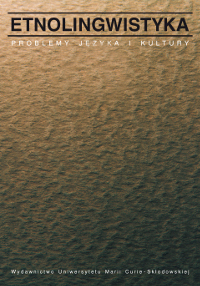Фольклорный мир в алфавитном порядке
THE WORLD OF FOLKLORE IN ALPHABETICAL ORDER
Author(s): Aleksandr Timofeevich KhrolenkoSubject(s): Anthropology, Language and Literature Studies, Customs / Folklore, Applied Linguistics
Published by: Wydawnictwo Naukowe Uniwersytetu Marii Curie-Sklodowskiej
Keywords: the dictionary of the language of folklore; folklore genres; perennial plants; folkloristic worldview; spiritual culture of Russian people; N. Tolstoy; S. Tolstoya; J. Bartmiński; S. Nikitina
Summary/Abstract: The recent decades have witnessed extraordinary proliferation of lexicographic work. Numerous publications have appeared both in Russia and elsewhere, sonic of them rather peculiar, such as dictionaries of prison slang or obscene expressions. Although so far there has been no dictionary of the language of folklore, three projects on the language of Russian folklore and one on Polish folklore are currently under way. Of these, two are ethnolinguistic and two linguistic-folkloristic in nature. The former category includes dictionaries compiled in Moscow under the supervision of Nikita and Svetlana Tolstoy and the one compiled in Lublin under the supervision of Jerzy Bartmiński. To the latter category belong those complied in Moscow under the supervision of Serafima Nikitina and in Kursk under the supervision of A. T. Khrolenko.The latter of these is a typically linguistic enterprise, it only records data from texts of folklore. A dictionary entry, which contains all collocations of a particular lexeme, consists of the following parts: (1) identificational, (2) paradigmatic, (3) syntagmatic, (4) paradigmatic-syntagmatic, (5) word-formational, (6) functional, (7) informational. A few entries serve as exemplification: ręka, zelenyy, promolvit’, vpolsvista.An assumption is made that the same descriptive method will be utilized for the language of perennial plants, the first category to be characterized, and for that of lyric songs and other genres of folklore. With time, the dictionaries of the language of different folklore genres will be combined into one whole. Only autosemantic words will be taken into account. Pronouns will be excluded for their lack of folkloristic specification and little value for arriving at a folkloristic worldview. The linguistic-folkloristic dictionary from Kursk will provide information not only about language but also about the spiritual culture of the Russians.
Journal: Etnolingwistyka. Problemy Języka I Kultury
- Issue Year: 12/2000
- Issue No: 12
- Page Range: 121-138
- Page Count: 18
- Language: Russian

